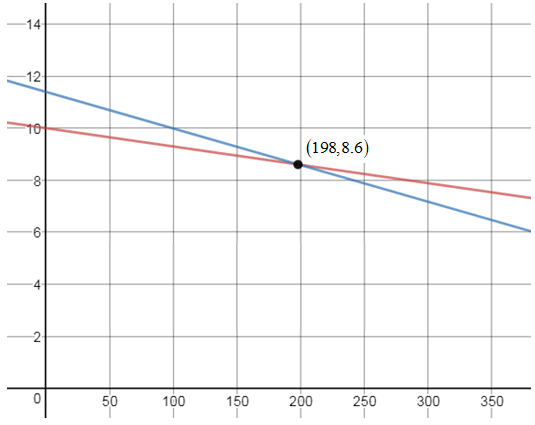
Concept explainers
(a)
Equations for winning times for men and women since 1964.
(a)
Answer to Problem 69PPS
For men:
y=−0.00705x+10
For women:
y=−0.01409x+11.4
Explanation of Solution
Given information:
Table for winning times (in seconds) for the 100 − meter dash at the Olympics between 1964 and 2008:
| Years since 1964, x | Men’s Gold Medal Time | Women’s Gold Medal Time |
| 0 | 10.0 | 11.4 |
| 4 | 9.90 | 11.0 |
| 8 | 10.14 | 11.07 |
| 12 | 10.06 | 11.08 |
| 16 | 10.25 | 11.06 |
| 20 | 9.99 | 10.97 |
| 24 | 9.92 | 10.54 |
| 28 | 9.96 | 10.82 |
| 32 | 9.84 | 10.94 |
| 36 | 9.87 | 10.75 |
| 40 | 9.85 | 10.93 |
| 44 | 9.69 | 10.78 |
Winning times for men:
Find the slope first using first and last winning points.
To find the slope, use the pair of points (0, 10.0) and (44, 9.69):
For slope:
m=y2−y1x2−x1
Substitute using the pair of points:
m=9.69−10.044−0
Perform operation inside parentheses:
m=−0.3144
Simplify the fraction:
m=−0.00705
Now,
Equation for point slope form:
y−y1=m(x−x1)
Let
x1,y1=(0, 10.0)
And
m=−0.00705
Substitute the values:
y−10.0=−0.00705(x−0)
Use distributive property:
y−10.0=−0.00705x+0
Add 10.0 on each side:
y−10.0+10.0=−0.00705x+0+10.0
Simplify:
y=−0.00705x+10.0
Winning times for women:
Find the slope first using first and last winning points.
To find the slope, use the pair of points (0, 11.4) and (44, 10.78):
For slope:
m=y2−y1x2−x1
Substitute using the pair of points:
m=10.78−11.444−0
Perform operation inside parentheses:
m=−0.6244
Simplify the fraction:
m=−0.01409
Now,
Equation for point slope form:
y−y1=m(x−x1)
Let
x1,y1=(0, 11.4)
And
m=−0.01409
Substitute the values:
y−11.4=−0.01409(x−0)
Use distributive property:
y−11.4=−0.01409x+0
Add 11.4 on each side:
y−11.4+11.4=−0.01409x+0+11.4
Simplify:
y=−0.01409x+11.4
(b)
Estimation of time at which women’s performance will catch up to men’s performance.
Graphically represent the equations for both men and women.
(b)
Answer to Problem 69PPS
Women’s performance will catch up to men’s performance approximately in the year 2162.
Explanation of Solution
Given information:
Table for winning times (in seconds) for the 100 − meter dash at the Olympics between 1964 and 2008:
| Years since 1964, x | Men’s Gold Medal Time | Women’s Gold Medal Time |
| 0 | 10.0 | 11.4 |
| 4 | 9.90 | 11.0 |
| 8 | 10.14 | 11.07 |
| 12 | 10.06 | 11.08 |
| 16 | 10.25 | 11.06 |
| 20 | 9.99 | 10.97 |
| 24 | 9.92 | 10.54 |
| 28 | 9.96 | 10.82 |
| 32 | 9.84 | 10.94 |
| 36 | 9.87 | 10.75 |
| 40 | 9.85 | 10.93 |
| 44 | 9.69 | 10.78 |
From Part (a),
We have
For men:
y=−0.00705x+10
For women:
y=−0.01409x+11.4
In the graph below,
Red line represents the equation for men.
And
Blue line represents the equation for women.

Graphing the two equations, the men’s and women’s winning points will meet approximately at (198, 8.6).
This implies
In the year 2162 (2164 is the actual Olympics),
Women will catch up to the performance of men.
However,
The prediction is not reasonable because the number of winning gold medal may vary from men’s and women’s division.
Chapter 3 Solutions
Glencoe Algebra 2 Student Edition C2014
Additional Math Textbook Solutions
Intro Stats, Books a la Carte Edition (5th Edition)
Elementary Statistics (13th Edition)
University Calculus: Early Transcendentals (4th Edition)
Basic Business Statistics, Student Value Edition
Elementary Statistics: Picturing the World (7th Edition)
- 2. Find the exact value of 12 + 12+12+√√12+ √12+ 12arrow_forwardTechnetium-99m is used as a radioactive tracer for certain medical tests. It has a half-life of 1 day. Consider the function TT where T(d)T(d) =100(2)−d=100(2)−d is the percent of Technetium-99m remaining dd days after the test. Which expression represents the number of days until only 5% remains?arrow_forward1. Find the inverse of f(x) = = 2x 1+2x Then find the domain of the inverse.arrow_forward
- 1. a scientist observed a bacterium in a microscope. it measured about .0000029 meter in diameter which of the following is closest to it? A- 2 x 10^-6, B- 2 x 10^-5, C- 3 x 10^-5, or D- 3 x 10^-6 2.express the product of 500 and 400 in scientific notation. is it 2 x 10^5 or 2 x 10^4 or 2 x 10^3 or 20 x 10^4arrow_forwardPlease Help me answer this linear algebra question. This is a practice textbook question.arrow_forwardPlease Help me answer this linear algebra question. This is a practice textbook question.arrow_forward
- TY D om E h om ng 00 C B A G F Q ו 3 13 Details Find an Euler path for the graph. Enter your response as a sequence of vertices in the order they are visited, for example, ABCDEA. fic ► Question Help: Video Message instructor Submit Question tor arch 園 A Wind advisoryarrow_forwardYou are provided with three 2D data points, p1, p2 and p3. Solving A C = B for C provides youwith the coefficients of a natural cubic spline curve that interpolates these points.Additionally, you have been given A and B, but some elements are missing. Moreover, the last two rowsof A are entirely absent. Your task is to determine and fill in the missing elements. For the last two rows,enforce a zero tangent at the beginning (in p1) and a not-a-knot boundary condition in p2. The matricesA and B are given as follows:Explain how to find the entries of A and B . How would you adapt these matrices if the data pointswere 3D? What if your spline should go through five data points? How many “extra rows” would there thenbe (with “extra” meaning “in addition to securing C2-continuity”)?arrow_forwardWhich graph represents f(x) = √x-2+3?arrow_forward
 Algebra and Trigonometry (6th Edition)AlgebraISBN:9780134463216Author:Robert F. BlitzerPublisher:PEARSON
Algebra and Trigonometry (6th Edition)AlgebraISBN:9780134463216Author:Robert F. BlitzerPublisher:PEARSON Contemporary Abstract AlgebraAlgebraISBN:9781305657960Author:Joseph GallianPublisher:Cengage Learning
Contemporary Abstract AlgebraAlgebraISBN:9781305657960Author:Joseph GallianPublisher:Cengage Learning Linear Algebra: A Modern IntroductionAlgebraISBN:9781285463247Author:David PoolePublisher:Cengage Learning
Linear Algebra: A Modern IntroductionAlgebraISBN:9781285463247Author:David PoolePublisher:Cengage Learning Algebra And Trigonometry (11th Edition)AlgebraISBN:9780135163078Author:Michael SullivanPublisher:PEARSON
Algebra And Trigonometry (11th Edition)AlgebraISBN:9780135163078Author:Michael SullivanPublisher:PEARSON Introduction to Linear Algebra, Fifth EditionAlgebraISBN:9780980232776Author:Gilbert StrangPublisher:Wellesley-Cambridge Press
Introduction to Linear Algebra, Fifth EditionAlgebraISBN:9780980232776Author:Gilbert StrangPublisher:Wellesley-Cambridge Press College Algebra (Collegiate Math)AlgebraISBN:9780077836344Author:Julie Miller, Donna GerkenPublisher:McGraw-Hill Education
College Algebra (Collegiate Math)AlgebraISBN:9780077836344Author:Julie Miller, Donna GerkenPublisher:McGraw-Hill Education





